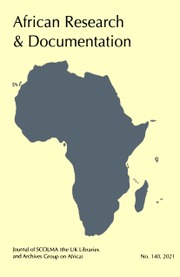No CrossRef data available.
Article contents
Documentation and Freedom of Information in the New South Africa
Published online by Cambridge University Press: 25 April 2022
Extract
One of the key elements in the maintenance of freedom of information and comprehensive documentation lies in the strength of civil society. This may be defined as that part of the nation which is critically and historically conscious, articulate and non-deferential, and independent of the state. South Africa has a long and proud tradition of strong institutions and individuals that have underpinned a durable civil society. Its tenacity, as well as its links to the international community, may be seen as one of the major reasons for the ultimate failure of apartheid ideology. From 1960 to 1980, the main contribution of civil society was to document and circulate information that contested the legitimacy of the state. The work of academics, clerics, journalists, lawyers and trade unionists became a (and at certain times the) major form of opposition and resistance to the government.
- Type
- Articles
- Information
- Copyright
- Copyright © African Research & Documentation 1998




